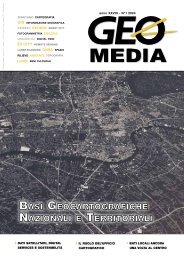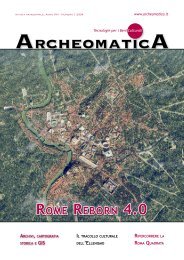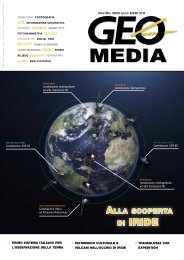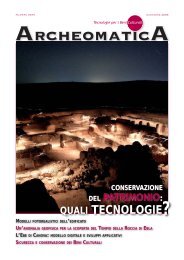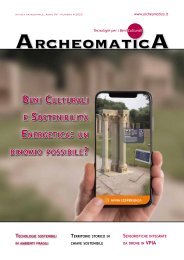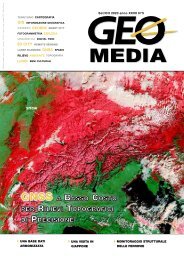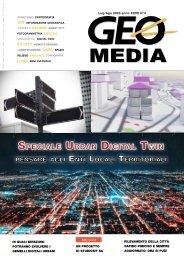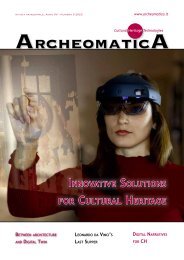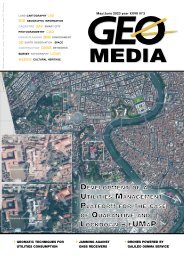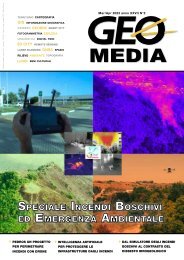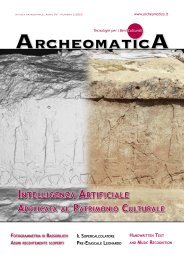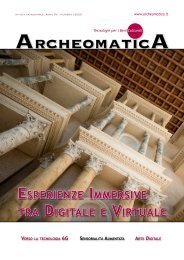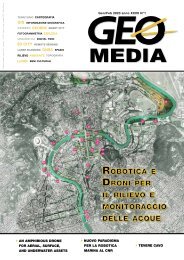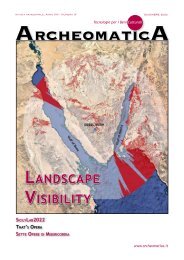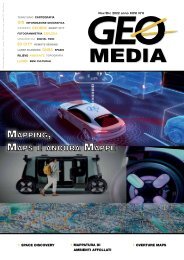GEOmedia 3 2020
The first italian geomatics magazine
The first italian geomatics magazine
Create successful ePaper yourself
Turn your PDF publications into a flip-book with our unique Google optimized e-Paper software.
MERCATO
CELEBRATING
100 YEARS
SOKKIA.COM
40 GEOmedia n°1/2-2020
MAKING AQUACULTURE
MORE SUSTAINABLE AND
EFFICIENT WITH RHETICUS
AQUACULTURE
Is there a connection between aquaculture,
climate change and satellite Earth
Observation?
Fish and seafood play a significant role
in the human diet and represent a very
important source of protein. About
20% of the world’s population takes at
least 20% of animal protein from fish.
According to the FAO, human population
growth is expected to rise fish consumption
by around 1.2% per year over
the next ten years. By 2030, the production
of fish and seafood products is expected
to exceed 200 million tons compared
to the current world catch fishing
production of around 90-95 million
tons per year. In addition, today about
a third of fish resources are exposed to
excessive exploitation, and this lead to
the definition of the United Nations
2030 Agenda – Goal 14 “Conserve and
sustainably use the oceans, seas and marine
resources”.
Aquaculture represents the optimal solution
to ensure the production of fish
and shellfish necessary to meet global
needs. However, effective and sustainable
management of aquaculture sites
requires improvement of technologies
and production processes. Nonetheless,
fish and shellfish farms need to adapt
their farming techniques to the environmental
context, the habitat in which
animals live. Temperature, chlorophyll
and turbidity of marine waters significantly
affect the growth rate and health
of animals.
Climate changes have led to changes in
the sea temperature and in the quantities
of phytoplankton, factors that affect
the growth rates and mortality of animals
and, therefore, the productivity of
farms and the quality of products.
It is clear that a deeper knowledge of
these variables is fundamental for achieving
an optimized farm management.
An extraordinary source of information
comes, today, from Earth observation
satellites. Their data allow to carefully
estimate multiple parameters such as
sea temperature, chlorophyll concentration
(proxy of the presence of phytoplankton)
and water turbidity (proxy of
water quality).
Over the last 25 years, Planetek Italia has
gained great expertise in this field thanks
toseveral European Space Agency (ESA)
and European Commission research
programs, such as “Integrated Coastal
Water Management for MED (ICWM
for MED)”, “SAtellite Near Real Time
Monitoring Network (SAIMON)” and
“Marine-EO” projects, to name the latest.
As part of the European project “User
uptake activities Copernicus Marine
Environment Service (CMEMS) –
Promoting demonstrations of CMEMS
downstream services.”, coordinated by
Mercator Ocean, Planetek has furthermore
enhanced Copernicus CMEMS
data and services, creating an innovative
platform called Rheticus® providing ondemand
geoanalytics services specifically
designed for Environmental Reporting,
Maritime Engineering, as well as fishing
and aquaculture activities.
All these experiences have contributed
to the development of Rheticus®
Aquaculture service, specifically designed
for the management of mussel farming
sites. The service was developed
by Planetek Italia in partnership with
Bluefarm s.r.l. to provide mussel farmers
with a weekly digital bulletin of updated
information on trends of sea temperature
and chlorophyll, on growth rate
of molluscs, as well as growth trends
compared with past ones. The service
also provides an estimate of the optimal
harvesting time and expected volume of
productions.
Thanks to an agreement with the
Mediterranean Aquaculture Association
(AMA), 23 aquaculture sites distributed
along Italian coasts are using Rheticus®
Aquaculture to support the operational
management of mussel farms. The first
results of the initiative were presented in
a workshop organized last 20 February
2020 during the Aquafarm fair in
Pordenone.
The workshop confirmed a great interest
of farmers to receive constantly
updated information, useful for the
optimal management of their sites in a
typical Industry 4.0 logic suited to the
aquaculture sector. Among many emerged
ideas, there was a growing interest
in extending the service to other species
such as oysters, which are finding widespread
use in Italian seas.
https://www.geoforall.it/kfy88




